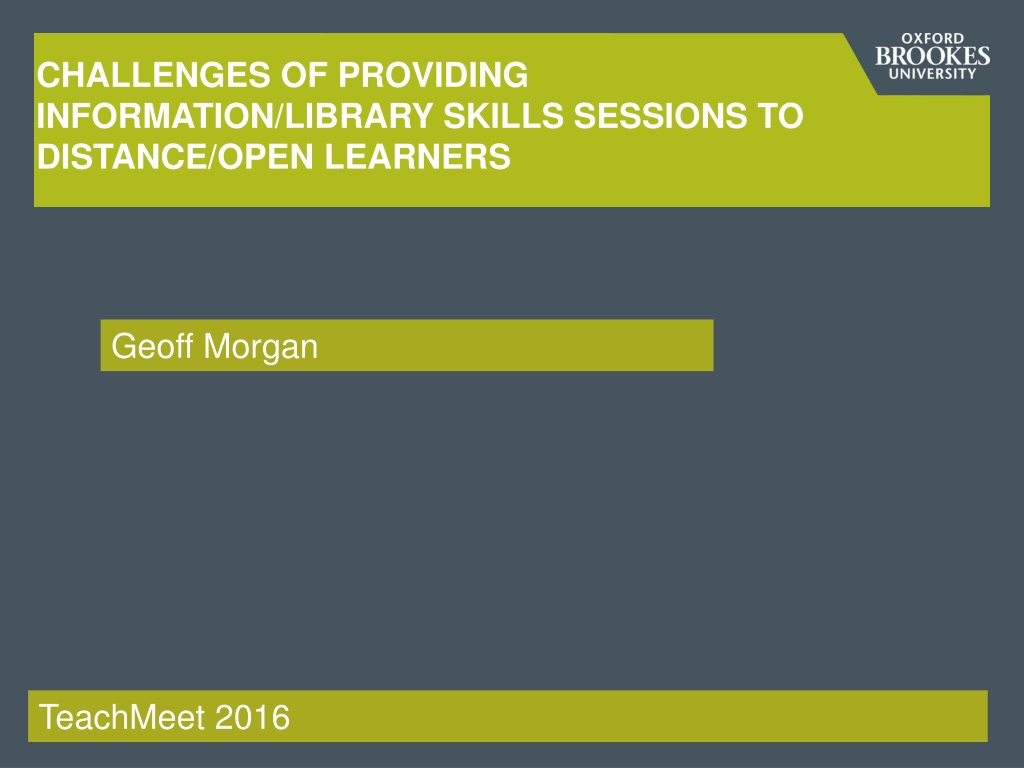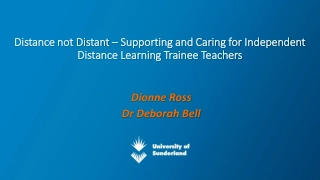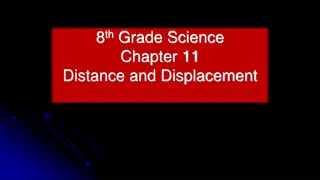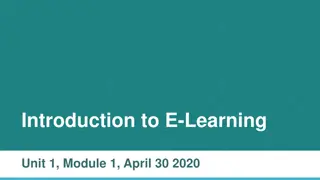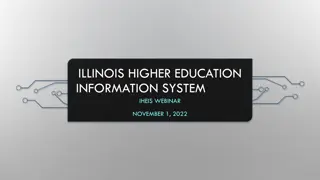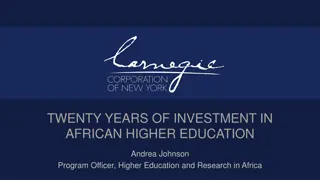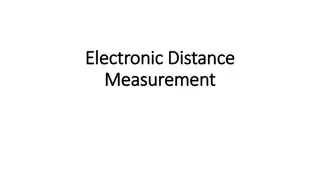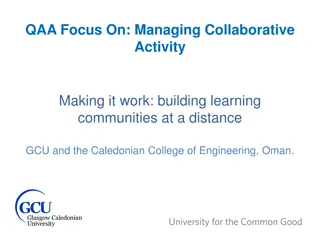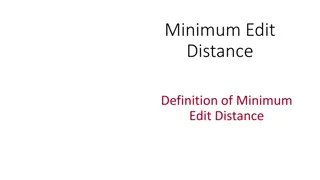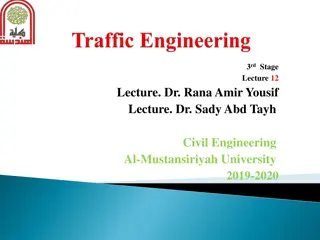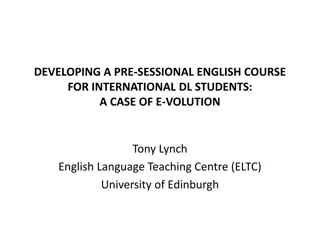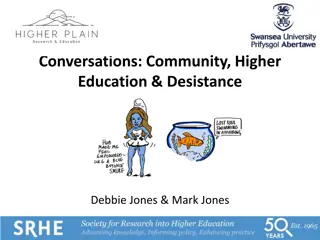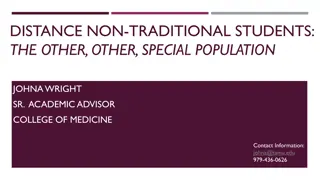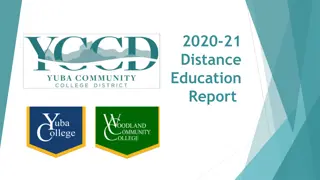Challenges and Support for Distance Learning in Higher Education
Exploring the challenges faced by distance learners in higher education, including limited access to university services and the need for proficient use of technology. Additionally, strategies for supporting students in courses such as Real Estate Investment Finance and Project Management in the Built Environment are highlighted, including face-to-face sessions, workshops, and library skills guidance.
Download Presentation

Please find below an Image/Link to download the presentation.
The content on the website is provided AS IS for your information and personal use only. It may not be sold, licensed, or shared on other websites without obtaining consent from the author. Download presentation by click this link. If you encounter any issues during the download, it is possible that the publisher has removed the file from their server.
E N D
Presentation Transcript
CHALLENGES OF PROVIDING INFORMATION/LIBRARY SKILLS SESSIONS TO DISTANCE/OPEN LEARNERS Geoff Morgan TeachMeet 2016
DEFINITIONS OF DISTANCE LEARNING Distance Learning refers to geography. Open Learning refers to time. In other words Learning at a time, pace and place which best suits the learner. (Fletcher, Learning et al. 2001) Other terminology: Autonomous learners Off Campus Students Non Traditional Students ANY OTHERS?
CHALLENGES FACED BY DISTANCE LEARNING STUDENTS Distance learning requires as many eyes and arms as you can find (Jones, 1998, p.27) Will not have access on a regular basis to the services offered by the university. Will not experience much , if any, face-to face contact with the university that s/he is enrolled. Will quite often have other responsibilities. Will have little contact with other students. Will have to be proficient in the use of ICT and be adept at using audio visual equipment. (e.g. Adobe and Moodle) In other words! The student will have to be a competent juggler , with many eyes and arms and simultaneously an ability to keep her/his eye on the ball, thus retaining focus and motivation throughout the study of the course.
STUDENTS STUDYING FOR A UK HE QUALIFICATION ENTIRELY OVERSEAS (HESA, 2016)
STUDENTS STUDYING ENTIRELY OVERSEAS BY LOCATION 2010 - 2015 (HESA, 2016)
COURSES WHICH I SUPPORT Real Estate Investment Finance (REIF) Project Management in the Built Environment (PMBE)
NEW COURSES STARTING IN 2016 MSc Quantity Surveying MA in Humanitarian Action and Peacebuilding
HOW I SUPPORT THE STUDENTS FOR MSC PROJECT MANAGEMENT IN THE BUILT ENVIRONMENT (PMBE) Provide information/library skills sessions as a part of a study week. (Face to face) Attend a meal usually held at the First Floor Restaurant Cowley Road. (Face to face) Invited to attend workshops and participate in course workshops. (Face to face) Add information for distance learners on subject guide. Point students to generic library guides Any other suggestions?
HOW I SUPPORT THE STAFF FOR MSC PMBE Attend Subject Committee meetings and annual reviews (advice on scanning, Aspire, e resources) Attend Away days Attend a meal usually held at the First Floor Restaurant Cowley Road Meet informally for coffee/tea
HOW I SUPPORT THE STUDENTS FOR MSC REAL ESTATE INVESTMENT FINANCE (REIF) (NEW COURSE WHICH STARTED IN 2015) This is a new course so it is still evolving and in contrast to the PMBE the students do not have the chance to visit Brookes. Participate in an open day using Adobe Connect. Provided a session on referencing using Adobe Connect. Provide help via email and elsewhere as requested. Other suggestions?
HOW I SUPPORT THE STAFF FOR MSC REIF Attend Subject Committee meetings and annual reviews Invited Academic staff setting up the programme to find out what their requirements are and how the library can support the students. Meet informally for coffee/tea Provide details of how non fee paying students can obtain information for their course. Advising freely available information sources.
REFLECTION ON CHALLENGES WITH MSC REIF Students are based entirely overseas mainly in South East Asia with English as a second language lesson plan to simplify library jargon.I tend to avoid terms such as Boolean; Zoe and Dimartino (cited in Hughes, 2002, p.209) suggest that this is helpful to those whose native language (eg Chinese ) has no function words including the conjunction and/or i.e. mindful of cultural differences Faulty equipment! Headphones, microphone, computer, software etc.. Check beforehand! Not all students are fee paying so do not have access to Brookes paid for subscriptions or ebooks. Library skills have to be provided using Adobe Connect or similar technology Advice can be given by email and has worked well but making sure who has access to the Brookes resources can be challenging.
WHERE DO WE GO FROM HERE? GOING THE DISTANCE What is the Potential for Growth in Distance Learning? (see slide 5) What other technologies are available? In this technological age the next generation cannot work without using digital gadgets and growing technologies (Hafeez et al, 2014, p.177) A system for providing library support? (Adobe, Chat, Social Media etc.) Social networks like Face book, Twitter and LinkedIn may be used for developing better networks between peers and academics (Hafeez et al, 2014, p.177). What do you do?
SERVICES TO DISTANCE LEARNERS PROVIDED BY OTHER UNIVERSITY LIBRARIES The Open University the largest UK s distance education provider is developing disabled user support to meet the needs of its large and growing disabled student population (Mears and Clough, 2015, p.73). http://www.open.ac.uk/library/ Sheffield University https://www.sheffield.ac.uk/library/services/dls Lancaster University http://www.lancaster.ac.uk/library/information-for/distance-learners/ Aberystwyth University https://www.aber.ac.uk/en/is/help/distancelearners/#d.en.69468
REFERENCES Fletcher, M. (2001) 'Distributed open and distance learning: how does e-learning fit? Learning and Skills Development Agency, London (England) available at: http://www.ldasa.org.uk/files/pdf/R1161.pdf (accessed 8 June 2016). Hafeez, A., Ahmed, A. and Zubia, N. (2014) 'Demanding need of growing technologies in distance learning system', Turkish Online Journal of Distance Education, 15(4), pp. 170- 180. HESA (2016) Statistical first release 224 - student enrolments and qualifications. Available at: https://www.hesa.ac.uk/sfr224 (accessed 8 June 2016). Hughes, H. (2002). Information literacy with an international focus. In: Lifelong Learning Conference 2002. Rockhampton, Queensland, Central Queensland University Press,, pp.208-213. Jones W.G. (1998) Transforming libraries: issues and innovations in distance learning, Association of Research Libraries, Washington D.C. Mears, W and Clough, H (2015) Online library accessibility support: a case study within the Open University, Open Learning, 2015 Vol. 30, No. 1. available at http://dx.doi.org/10.1080/02680513.2015.1025735 (accessed 8 June 2016)
LINKS Digital and Information Literacy Framework (Open University) http://www.open.ac.uk/libraryservices/pages/dilframework/ Standards for Distance Learning Library Services (ACRL) http://www.ala.org/acrl/standards/guidelinesdistancelearning
